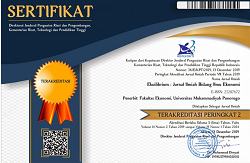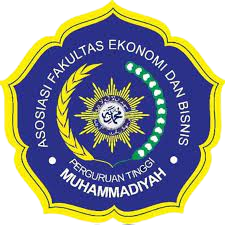Environmental Factors in Affecting Student Entrepreneurship Decision
DOI: 10.24269/ekuilibrium.v19i1.2024.pp59-72
Abstract
The aim of this research is to examine the influence of environmental factors on students' entrepreneurial decisions in Indonesia. Based on theoretical mapping and previous research, the results showed that the environmental factors in question are the internal and external environment. The research design used is quantitative, with the population consisting of alumni of the Master of Sharia Economics UIN SATU Tulungagung. Based on the distribution of questionnaires to 158 alumni, 123 respondents or 78% were obtained and the remaining 22% did not fill out the questionnaire. By analyzing data using regression, the results showed that there was a significant positive internal and external environment on entrepreneurial decisions. Respondents were motivated to become entrepreneurs because it has been their dream since birth, government policies are pro-entrepreneurship, open access to obtain financing, entrepreneurship has become a culture, and promises independence for an entrepreneur.
Keywords
References
- Agusmiati, D., & Wahyudin, A. (2019). Pengaruh Lingkungan Keluarga, Pengetahuan Kewirausahaan, Kepribadian, Dan Motivasi, Terhadap Minat Berwirausaha Dengan Self Efficacy Sebagai Variabel Moderating. Economic Education Analysis Journal, 7(3), 878–893. https://doi.org/10.15294/eeaj.v7i3.28317
- Al-Qadasi, N., Zhang, G., Al-Awlaqi, M. A., Alshebami, A. S., & Aamer, A. (2023). Factors influencing entrepreneurial intention of university students in Yemen: The mediating role of entrepreneurial self-efficacy. Frontiers in Psychology, 14(January), 1–14. https://doi.org/10.3389/fpsyg.2023.1111934
- Aliyah, I. (2017). Pemahaman Konseptual Pasar Tradisional di Perkotaan. Cakra Wisata, 18(2), 1–16. https://jurnal.uns.ac.id/cakra-wisata/article/view/34367
- Alvarez, C., Urbano, D., Coduras, A., & Ruiz‐Navarro, J. (2011). Environmental conditions and entrepreneurial activity: a regional comparison in Spain. Journal of Small Business and Enterprise Development, 18(1), 120–140. https://doi.org/https://doi.org/10.1108/14626001111106460
- Amrullah, A., Wahyudi, S., & Hapsari, M. M. (2022). Factors Influencing Student’s Intention to be An Entrepreneur (Literature Study). Nternational Conference on Education Innovation and Social Science (ICEISS), 237–245. https://proceedings.ums.ac.id/index.php/iceiss/article/view/1082%0Ahttps://proceedings.ums.ac.id/index.php/iceiss/article/download/1082/1058
- Anggraeni, B. (2015). Pengaruh Pengetahuan Kewirausahaan Dan Lingkungan Keluarga Terhadap Minat Berwirausaha Siswa Kelas Xi Smk Islam Nusantara Comal Kabupaten Pemalang. Jurnal Pendidikan Ekonomi Dinamika Pendidikan, X(1), 42–52.
- Arab, Z., & Sofiyabadi, J. (2013a). Entrepreneurship Indicators With an Emphasis on Global Entrepreneurship Monitor. International Journal of Research and Reviews in Applied Sciences, 16(2), 288–296. https://www.arpapress.com/Volumes/Vol16Issue2/IJRRAS_16_2_17.pdf
- Arab, Z., & Sofiyabadi, J. (2013b). Entrepreneurship Indicators With an Emphasis on Global Entrepreneurship Monitor. International Journal of Research and Reviews in Applied Sciences, 16(2), 288–296. http://arpapress.com/Volumes/Vol16Issue2/IJRRAS_16_2_17.pdf
- Ardiyani, N. P. P., & Kusuma, A. A. G. A. A. (2016). Pengaruh Sikap, Pendidikan Dan Lingkungan Keluarga Terhadap Minat Berwirausaha. E-Jurnal Manajemen Universitas Udayana, 5(8), 5155–5183. https://ojs.unud.ac.id/index.php/manajemen/article/download/22693/15062
- Astuti, S., & Sukardi, T. (2013). Faktor-faktor yang mempengaruhi kemandirian untuk berwirausaha pada siswa SMK. Jurnal Pendidikan Vokasi, 3(3), 334–346. https://doi.org/10.21831/jpv.v3i3.1847
- Azizah Ayu Ashari, & Tri Sudarwanto. (2022). Pengaruh Teman Sebaya Dan Media Sosial Terhadap Keputusan Pembelian pada Produk Lip Cream. Jurnal Sinar Manajemen, 9(2), 170–182. https://doi.org/10.56338/jsm.v9i2.2609
- Bastaman, A., & Juffiasari, R. (2015). Faktor-Faktor Yang Mempengaruhi Pengambilan Keputusan Bagi Wanita Untuk Berwirausaha (Studi Kasus Anggota Ikatan Wanita Pengusaha Indonesia DKI Jakarta). Prosiding Seminar Nasional 4 UNS SME’s Summit & AWARDS 2015, 4, 265–277. https://psp-kumkm.lppm.uns.ac.id/wp-content/uploads/sites/21/2016/01/aam-bastaman-prosiding-sme-s-combinedpdf_1.pdf
- Bezerra Vasconcelos, T., Macário de Oliveira, V., & Érica Nóbrega Correia, S. (2022). Indicators of the behavior of social entrepreneurs at the individual level. Contextus – Revista Contemporânea de Economia e Gestão, 20, 168–181. https://doi.org/10.19094/contextus.2022.78394
- Budiyono, H., & Setyawasih, R. (2017). Faktor Pribadi, Lingkungan, dan Sosiologi pada Tahap Inisiasi Proses Kewirausahaan Ikan Hias di Kota Bekasi. Optimal: Jurnal Fakultas Ekonomi Universitas Islam “45” Bekasi, 10(2), 101–127. http://jurnal.unismabekasi.ac.id/index.php/optimal/article/view/17/5
- Bugawa, A., & Aljuwaisri, S. M. (2019). Internal and external factors on women’s entrepreneurship performance in the state of Kuwait. Arab Gulf Journal of Scientific Research, 37(3), 33–53. https://doi.org/10.51758/agjsr-03-2019-0011
- Cahyadi, L. D. C. R., & Pradnyani, N. L. P. S. P. (2020). Keputusan Strategis Pelaku Umkm Dalam Menghadapi Krisis Ekonomi. SINTESA Prosiding, 181–186. https://doi.org/10.24843/eeb.2021.v10.i04.p05
- Ciputra. (2013). Ciputra Quantum Leap: Entrepreneurship Mengubah Masa Depan Bangsa dan Masa Depan Anda. Jakarta: Elex Media Komputindo. ISBN 978-979-27-4145-2.
- Darojah, Z., Quro’i, M. D., & Dewi, D. K. (2018). Peran Kewirausahaan dalam Pertumbuhan Ekonomi Islam di Indonesia. Maliyah : Jurnal Hukum Bisnis Islam, 8(2), 218–253. https://doi.org/10.15642/maliyah.2018.8.2.70-105
- Fahmi, I., Fachruddin, R., & Silvia, V. (2019). Analisis E-Business pada Keputusan Kewirausahaan Bisnis Digital (Sebuah Kajian Literatur Studi). Proseding Seminar Nasional Kewirausahaan, 1(1), 71–75. https://doi.org/https://doi.org/10.30596/snk.v1i1.3583
- Fajri, A. (2021). Peran Kewirausahaan Dalam Pembangunan Ekonomi. Iqtishodiyah: Jurnal Ekonomi Dan Bisnis Islam, 7(2), 104–112. https://doi.org/https://doi.org/10.36835/iqtishodiyah.v7i2.619
- Fatchurrohman, & Ruwandi. (2018). Model Pendidikan Entrepreneurship Di Pondok Pesantren. Inferensi: Jurnal Penelitian Sosial Keagamaan, 12(2), 395–416. https://inferensi.iainsalatiga.ac.id/index.php/inferensi/article/view/1869/pdf
- Fitria, S. E., & Ariva, V. F. (2018). Analisis Faktor Kondisi Ekonomi, Tingkat Pendidikan Dan Kemampuan Berwirausaha Terhadap Kinerja Usaha Bagi Pengusaha Pindang Di Desa Cukanggenteng. Jurnal Manajemen Indonesia, 18(3), 197–208.
- Galay, M., Macabata, N., & Galay- Limos, J. (2023). Environmental factors affecting entrepreneurial intention of senior high school students’ in San Jose, Occidental Mindoro. International Journal of Research Studies in Management, 11(1). https://doi.org/10.5861/ijrsm.2023.1002
- Giam, H. S., & Breliastiti, R. (2015). Pengaruh Ukuran Perusahaan, Leverage dan Tipe Industri terhadap Corporate Information Transparency on The Internet (e-CTI) Perusahaan LQ45. Jurnal Akuntansi Bisnis, 8(2), 1–31. https://doi.org/http://dx.doi.org/10.30813/jab.v8i2.813
- International Labour Organization (ILO). (2021). Internal and external factors for SME success. https://www.ilo.org/wcmsp5/groups/public/---ed_dialogue/---act_emp/documents/publication/wcms_830580.pdf
- Irawati, R. (2017). Pengambilan Keputusan Usaha Mandiri Mahasiswa Ditinjau dari Faktor Internal dan Eksternal. Jurnal JIBEKA, 11(1), 58–69.
- Irawati, R. (2022). Pengambilan Keputusan Reseller Frozen Food Sebagai Pilihan Berwirausaha Di Masa Pandemi. Competence : Journal of Management Studies, 16(2), 130–148. https://doi.org/10.21107/kompetensi.v16i2.17596
- Isma, A., Sudarmiatin, Rakib, M., & Dewantara, H. (2020). The Effect Of Parents’ Socio-Economic Status And Entrepreneurship Education Toward Students’ Entrepreneurial Interests At Universitas Negeri Makassar. Jurnal Nalar Pendidikan, 8(1), 37–46.
- Jannah, Y., & Siswanto. (2021). Potret Pendidikan Enterpreneur di Pesantren Portrait of Entrepreneur Education at Islamic Boarding School. POTENSIA: Jurnal Kependidikan Islam, 7(1), 86–110.
- Khairinal, K., Syuhadah, S., & Aminah, S. (2022). Pengaruh kondisi sosial ekonomi orang tua, potensi diri, dan dukungan teman sebaya terhadap keputusan siswa memilih universitas jambi. JMIS (Jurnal Manajemen Pendidikan Dan Ilmu Sosial), 3(2), 754–762. https://doi.org/https://doi.org/10.38035/jmpis.v3i2
- Khamimah, W. (2021). Peran Kewirausahaan Dalam Memajukan Perekonomian Indonesia. Jurnal Disrupsi Bisnis, 4(3). https://doi.org/10.32493/drb.v4i3.9676
- Kumalasari, D. A., & Andayani, E. (2017). Minat Berwirausaha: Kompetensi Kewirausahaan, Sikap Berwirausaha dan Kreativitas. Jurnal Riset Pendidikan Ekonomi, 2(2), 1–5.
- Kurniati, I., Andriyani, I. N., & Azis. (2021). Konsep Kewirausahaan dalam Tafsir Al-Azhar dan Relevansinya dengan Materi Mata Kuliah Kewirausahaan. At Turots: Jurnal Pendidikan Islam, 3(1), 61–74. https://doi.org/10.51468/jpi.v3i1.34
- Kuznetsova, N. V., Rahimova, L. M., Gafurova, V. M., Simakov, D. B., Zinovyeva, E. G., & Ivanova, L. A. (2017). External environment as a factor of ensuring the competitiveness of organizations in the regional market of medical services. European Research Studies Journal, 20(4), 308–322. https://www.ersj.eu/dmdocuments/2017-xx-4-a-22.pdf
- Lucky, E. O., & Ibrahim, N. A. (2015). Environmental Factors and Entrepreneurial Intention Among Nigerian Students in UUM. Sains Humanika, 5(2), 87–93. https://www.researchgate.net/publication/278524812_Environmental_Factors_And_Entrepreneurial_Intention_Among_Nigerian_Students_In_UUM
- Mardanugraha, E., & Akhmad, J. (2023). Ketahanan UMKM di Indonesia menghadapi Resesi Ekonomi. Jurnal Ekonomi Dan Pembangunan, 30(2), 101–114. https://doi.org/10.14203/jep.30.2.2022.101-114
- Morales, M., & Velilla, J. (2021). The effect of cultural environment on entrepreneurial decisions. International Journal of Social Economics, 48(9), 1309–1330. https://doi.org/https://doi.org/10.1108/IJSE-02-2020-0113
- Nurdiana, N., Rahmatullah, R., Hasan, M., Nurjannah, N., & Fitriani, F. (2022). Pengetahuan Wirausaha, Motivasi Berwirausaha, Kondisi Sosial Ekonomi Dan Lingkungan Keluarga, Pengaruhnya Terhadap Minat Berwirausaha Ibu Rumah Tangga. PROMOSI (Jurnal Pendidikan Ekonomi), 10(2), 50–63. https://doi.org/10.24127/pro.v10i2.6558
- Nurudin, N. (2018). Pengaruh Minat dan Lingkungan Keluarga Terhadap Keputusan Wanita Muslim Berwirausaha. Sawwa: Jurnal Studi Gender, 12(3), 321. https://doi.org/10.21580/sa.v12i3.2085
- OECD. (2017). “List of Indicators of Entrepreneurial Determinants”, in Entrepreneurship at a Glance 2017. OECD Publishing, Paris. https://doi.org/DOI: https://doi.org/10.1787/entrepreneur_aag-2017-29-en
- Oluwadare, A., & Oni, I. (2016). The Effect of Internal Environment on the Performance of Small and Medium Scale Enterprise in Kano Metropolis. International Journal of Management and Commerce Innovations, 3(2), 120–126. https://www.researchpublish.com/upload/book/The Effect of Internal-2385.pdf
- Peng, H., Li, B., Zhou, C., & Sadowski, M. (2021). How does the appeal of environmental values influence sustainable entrepreneurial intention? International Journal of Environmental Research and Public Health, 18(3), 1–25. https://doi.org/10.3390/ijerph18031070
- Prakarsa, L. M., & Tarigan, J. (2016). Pengaruh Kepuasan Pelanggan Terhadap Kinerja Keuangan Melalui Loyalitas Pelanggan Sebagai Variabel Intervening Pada Berbagai Sektor Perusahaan Di Indonesia. Business Accounting Review, 4(1), 362–372.
- Ram, D., Singh, M. K., Chaudhary, K. P., & Jayarani, L. (2013). Entrepreneurship Behaviour of Women Entrepreneurs in Imphal of Manipur. Indian Res. J. Ext. Edu, 13(2), 31–35.
- Ramadhanti, D., Mulyadi, H., & Razati, G. (2017). Pengaruh Status Sosial Ekonomi Orang Tua Terhadap Sikap Kewirausahaan. Strategic : Jurnal Pendidikan Manajemen Bisnis, 16(2), 32. https://doi.org/10.17509/strategic.v16i2.7068
- Ridwan, M. (2021). Pelatihan Survei Kepuasan Pelanggan Untuk Wirausaha Muda. Jurnal Pekamas, 1(2), 63–69. https://doi.org/10.46961/pkm.v1i2.428
- Saifudin, A. (2016). The effect of perceptions learning of the entrepreneurship practicum course and the peer environments on the entrepreneurial decisions among students of economics education. Jurnal Pendidikan Dan Ekonomi, 5(3), 176–185.
- Santoso, A., Rahmawati, R., & Sudarno. (2016). APLIKASI FUZZY ANALYTICAL HIERARCHY PROCESS UNTUK MENENTUKAN PRIORITAS PELANGGAN BERKUNJUNG KE GALERI (Studi Kasus di Secondhand Semarang). Jurnal Gaussian, 5(2), 239–248. http://ejournal-s1.undip.ac.id/index.php/gaussian
- Shibgotulloh, M., & Bahri, E. S. (2015). Peran Pesantren Entrepreuner Dalam Pengembangan Masyarakat (Studi Kasus Pesantren Entrepreuner Bekasi). Jurnal Ekonomi Dan Perbankan Syariah, 3(2), 1–24. http://muqtasid.iainsalatiga.ac.id/index.php/muqtasid/
- Siahaan, S. H. B. (2023). Analysis of factors influencing youth entrepreneurial decisions in Yogyakarta Special Regency. Asian Management and Business Review, 3(1), 74–89. https://doi.org/10.20885/ambr.vol3.iss1.art7
- Sinring, K. (2022). Analisis Sikap Wirausaha Terhadap Perubahan Status Sosial Ekonomi Dimasa Pandemi Covid-19: Sebuah Tinjauan Pustaka. EKOMBIS REVIEW: Jurnal Ilmiah Ekonomi Dan Bisnis, 10(2), 1413–1420. https://doi.org/10.37676/ekombis.v10i2.2802
- Siswanto, Supriyanto, A. S., Suprayitno, E., Ekowati, V. M., Sujianto, A. E., Johari, F. B., Ridlo, A., Haris, A., & Ridwan, M. (2022). The Effects of Leadership Styles on Organizational Innovation in Universities in Indonesia and Malaysia. Journal of Behavioral Science, 17(2), 90–103.
- Sujianto, A. ., & Azmi, M. F. . (2020). Associative Study on Government Spending, Inflation, Trade Balance, and Gross Domestic Product. Ekuilibrium: Jurnal Ilmiah Bidang Ilmu Ekonomi, 15(1), 27–37.
- Sujianto, A. E. (2009). Aplikasi statistik dengan SPSS 16.0. Jakarta: Prestasi Pustaka.
- Sujianto, A. E. (2020). Macroeconomic factors and balance of payment: Evidence from Indonesia. Industrial Engineering and Management Systems. https://doi.org/10.7232/iems.2020.19.1.266
- Sulastri, Mulyadi, H., & Nurhidayah. (2021). The Influence of Internal and External Factors on Entrepreneurial Intentions. Advances in Economics, Business and Management Research: 6th Global Conference on Business, Management, and Entrepreneurship (GCBME 2021), 200, 548–552. https://www.atlantis-press.com/article/125976006.pdf
- Sumarsono, H. (2013). Faktor-Faktor Yang Mempengaruhi Intensi Wirausaha Mahasiswa Universitas Muhammadiyah Ponorogo. Jurnal Ekuilibrium, 11(2), 62–88.
- Suryana, T., Sudirman, I., & Rusliati, E. (2017). External and Internal Environment, and Business Ethic on Business Partnership and its Implication on Small Enterprise Performance in West Java. Trikonomika, 16(1), 8. https://doi.org/10.23969/trikonomika.v16i1.416
- Syam, A., & Sudarmi, S. (2019). Analysis of Student Entrepreneurship decision making in the Learning Prerspective. Jurnal Ad’ministrare, 6(1), 51. https://doi.org/10.26858/ja.v6i1.9707
- Wiani, A., Ahman, E., & Machmud, A. (2018). Pengaruh Lingkungan Keluarga Terhadap Minat Berwirausaha Peserta Didik Smk Di Kabupaten Subang. Jurnal MANAJERIAL, 17(2), 227. https://doi.org/10.17509/manajerial.v17i2.11843
- Widhiastuti, N. L. P., & Dewi, N. L. P. S. (2020). Minat Berwirausaha dan Faktor-Faktor yang Mempengaruhinya. Jurnal Riset Akuntansi, 10(2), 199–209.
- Widiastuti, I. (2022). Peningkatan Perekonomian Masyarakat Terdampak Covid-19 Melalui Penyuluhan Wirausaha Berbasis Teknologi di Kecamatan Grogol Jakarta Barat. Dikmas: Jurnal Pendidikan Masyarakat Dan Pengabdian, 2(2), 269–280. https://doi.org/10.37905/dikmas.2.2.269-280.2022
- Wijaya, T. (2008). Kajian Model Empiris Perilaku Berwirausaha UKM DIY dan Jawa Tengah. Jurnal Manajemen Dan Kewirausahaan, 10(2), 93–104. http://puslit2.petra.ac.id/ejournal/index.php/man/article/view/17036
- Xing, R., Zhou, N., Dang, Z., & Wang, G. (2022). The Relationship Between Cognitive Adaptability and Entrepreneurial Decision-making Quality: A Moderating Effect of Environmental Uncertainty. Proceedings of the 4th International Seminar on Education Research and Social Science (ISERSS 2021), 635(Iserss 2021), 27–34. https://doi.org/10.2991/assehr.k.220107.006
- Zahra, A. A., Husna, A. N., & Haq, A. L. A. (2019). Dinamika Pengambilan Keputusan dan Perkembangan Jiwa Wirausaha pada Mahasiswa. Psympathic : Jurnal Ilmiah Psikologi, 6(1), 111–130. https://doi.org/10.15575/psy.v6i1.3464
Refbacks
- There are currently no refbacks.

This work is licensed under a Creative Commons Attribution-ShareAlike 4.0 International License.














